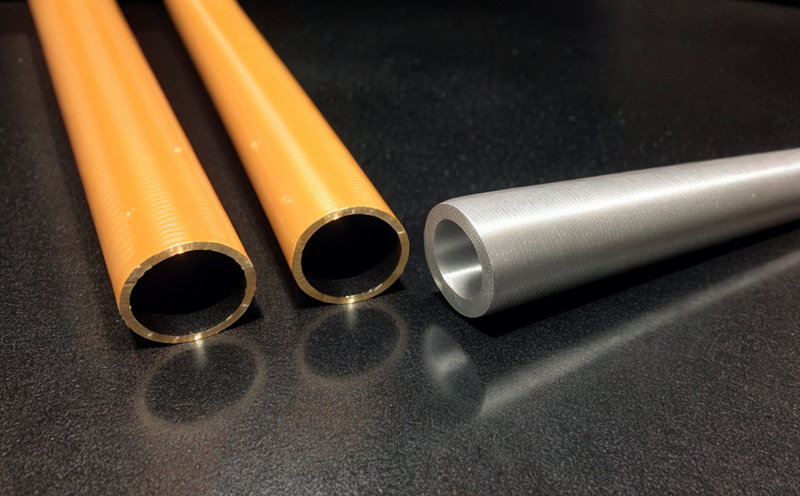ASTM D7264 Flexural Properties of Polymer Matrix Composites
The ASTM D7264 standard test method is a widely recognized procedure used to determine the flexural properties of polymer matrix composites, which are crucial in aerospace and aviation applications. This testing ensures that materials meet stringent requirements set by industry standards, enhancing safety and performance.
The primary focus is on measuring the flexural modulus (Eflex) and flexural strength (σfcu) of composite materials under specified loading conditions. The test involves subjecting a specimen to a three-point bending load until failure, typically using an UTM. This method provides valuable insights into the material's mechanical behavior and is essential for quality assurance in aerospace and aviation.
The ASTM D7264 test protocol specifies the dimensions of the composite specimens (typically rectangular prisms), loading rates, environmental conditions, and the use of standard testing machines. Compliance with these parameters ensures accurate and reproducible results, which are critical for regulatory approval and design validation.
Understanding the flexural properties of polymer matrix composites is vital in aerospace and aviation due to the demanding operational environments and safety regulations. These materials must withstand high stresses without compromising structural integrity. The ASTM D7264 test helps manufacturers ensure that their products meet these rigorous requirements, thereby enhancing reliability and performance.
Materials such as carbon fiber-reinforced plastics (CFRP) and glass-fiber-reinforced polymers are widely used in aerospace components like wing structures, fuselage sections, and landing gear. The flexural properties determined by ASTM D7264 play a significant role in the design process, helping engineers optimize material selection and component design for weight reduction while maintaining strength.
The test results from ASTM D7264 are reported as stress-strain curves and ultimate load at failure. These data points provide a comprehensive understanding of how composite materials behave under bending loads. This information is invaluable for predicting real-world performance, especially in dynamic loading scenarios common in flight operations.
In addition to mechanical properties, the ASTM D7264 test helps identify any potential flaws or inconsistencies within the material matrix. By detecting these issues early in the development process, manufacturers can improve product quality and reduce the risk of failures during use.
Why It Matters
The flexural properties determined by ASTM D7264 are critical for ensuring that aerospace components meet stringent safety standards. These tests provide essential data on how composite materials behave under bending loads, which is particularly important in high-stress environments like those encountered during takeoff and landing.
Compliance with ASTM D7264 ensures that manufacturers produce reliable parts that can withstand the rigors of flight. This not only enhances safety but also helps maintain brand reputation and regulatory compliance. The test results are often required for certification purposes, making it a vital step in the product development process.
In addition to safety and reliability, ASTM D7264 testing supports innovation by providing engineers with detailed insights into material performance. This information can be used to refine design processes, optimize material properties, and develop new composite formulations that meet evolving industry needs.
The test also plays a crucial role in supply chain management. By ensuring that all materials meet the same high standards, it helps maintain consistency across suppliers and production batches. This is particularly important for large aerospace manufacturers who rely on multiple sources for their raw materials.
Industry Applications
| Application | Description |
|---|---|
| Airframe Structures | Composite materials are used in wings, fuselages, and landing gear to improve strength-to-weight ratios. |
| Landing Gear Systems | The flexural properties of composite materials help ensure that landing gears can withstand the high loads during touchdown and takeoff. |
| Propulsion Systems | Flexural testing is used to evaluate the durability of components in jet engines and other propulsion systems. |
| Airfoil Design | The flexural properties contribute to optimizing airfoil shapes for aerodynamic efficiency. |
ASTM D7264 testing is essential across these applications, providing critical data on how composite materials perform under bending loads. This information is used to improve design and manufacturing processes, ensuring that aerospace components meet the highest standards of safety and performance.
Competitive Advantage and Market Impact
- Ensures compliance with international standards, enhancing brand reputation.
- Provides detailed insights into material performance, supporting innovation and design optimization.
- Maintains consistent quality across supply chains, reducing the risk of failures during use.
- Facilitates regulatory approval and certification, opening doors to new markets.
The results from ASTM D7264 testing provide a competitive edge by ensuring that aerospace components are safe, reliable, and meet industry expectations. This can lead to increased market share and customer confidence, driving business growth in the aviation sector.





